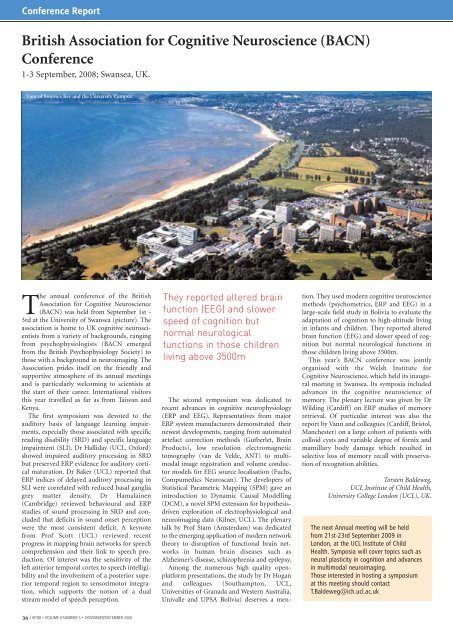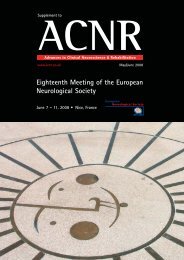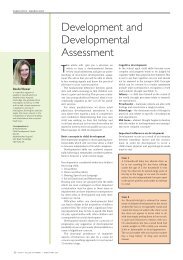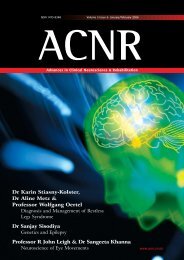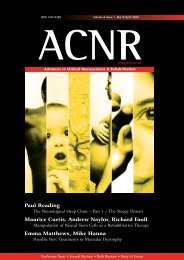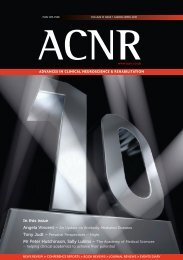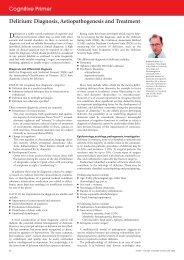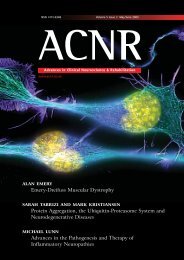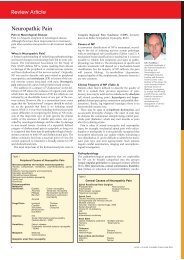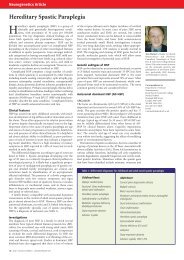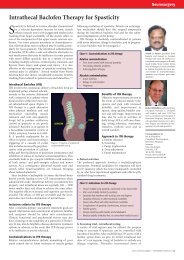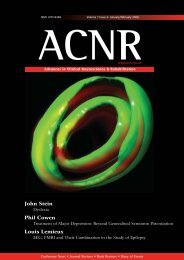Unn Ljøstad and Åse Mygland Jone Furlund Owe and Nils ... - ACNR
Unn Ljøstad and Åse Mygland Jone Furlund Owe and Nils ... - ACNR
Unn Ljøstad and Åse Mygland Jone Furlund Owe and Nils ... - ACNR
Create successful ePaper yourself
Turn your PDF publications into a flip-book with our unique Google optimized e-Paper software.
Conference Report<br />
British Association for Cognitive Neuroscience (BACN)<br />
Conference<br />
1-3 September, 2008; Swansea, UK.<br />
View of Swansea Bay <strong>and</strong> the University Campus.<br />
The annual conference of the British<br />
Association for Cognitive Neuroscience<br />
(BACN) was held from September 1st -<br />
3rd at the University of Swansea (picture). The<br />
association is home to UK cognitive neuroscientists<br />
from a variety of backgrounds, ranging<br />
from psychophysiologists (BACN emerged<br />
from the British Psychophysiology Society) to<br />
those with a background in neuroimaging. The<br />
Association prides itself on the friendly <strong>and</strong><br />
supportive atmosphere of its annual meetings<br />
<strong>and</strong> is particularly welcoming to scientists at<br />
the start of their career. International visitors<br />
this year travelled as far as from Taiwan <strong>and</strong><br />
Kenya.<br />
The first symposium was devoted to the<br />
auditory basis of language learning impairments,<br />
especially those associated with specific<br />
reading disability (SRD) <strong>and</strong> specific language<br />
impairment (SLI). Dr Halliday (UCL, Oxford)<br />
showed impaired auditory processing in SRD<br />
but preserved ERP evidence for auditory cortical<br />
maturation. Dr Baker (UCL) reported that<br />
ERP indices of delayed auditory processing in<br />
SLI were correlated with reduced basal ganglia<br />
grey matter density. Dr Hamalainen<br />
(Cambridge) reviewed behavioural <strong>and</strong> ERP<br />
studies of sound processing in SRD <strong>and</strong> concluded<br />
that deficits in sound onset perception<br />
were the most consistent deficit. A keynote<br />
from Prof Scott (UCL) reviewed recent<br />
progress in mapping brain networks for speech<br />
comprehension <strong>and</strong> their link to speech production.<br />
Of interest was the sensitivity of the<br />
left anterior temporal cortex to speech intelligibility<br />
<strong>and</strong> the involvement of a posterior superior<br />
temporal region to sensorimotor integration,<br />
which supports the notion of a dual<br />
stream model of speech perception.<br />
They reported altered brain<br />
function (EEG) <strong>and</strong> slower<br />
speed of cognition but<br />
normal neurological<br />
functions in those children<br />
living above 3500m<br />
The second symposium was dedicated to<br />
recent advances in cognitive neurophysiology<br />
(ERP <strong>and</strong> EEG). Representatives from major<br />
ERP system manufacturers demonstrated their<br />
newest developments, ranging from automated<br />
artefact correction methods (Gutberlet, Brain<br />
Products), low resolution electromagnetic<br />
tomography (van de Velde, ANT) to multimodal<br />
image registration <strong>and</strong> volume conductor<br />
models for EEG source localisation (Fuchs,<br />
Compumedics Neuroscan). The developers of<br />
Statistical Parametric Mapping (SPM) gave an<br />
introduction to Dynamic Causal Modelling<br />
(DCM), a novel SPM extension for hypothesisdriven<br />
exploration of electrophysiological <strong>and</strong><br />
neuroimaging data (Kilner, UCL). The plenary<br />
talk by Prof Stam (Amsterdam) was dedicated<br />
to the emerging application of modern network<br />
theory to disruption of functional brain networks<br />
in human brain diseases such as<br />
Alzheimer’s disease, schizophrenia <strong>and</strong> epilepsy.<br />
Among the numerous high quality openplatform<br />
presentations, the study by Dr Hogan<br />
<strong>and</strong> colleagues (Southampton, UCL,<br />
Universities of Granada <strong>and</strong> Western Australia,<br />
Univalle <strong>and</strong> UPSA Bolivia) deserves a mention.<br />
They used modern cognitive neuroscience<br />
methods (psychometrics, ERP <strong>and</strong> EEG) in a<br />
large-scale field study in Bolivia to evaluate the<br />
adaptation of cognition to high-altitude living<br />
in infants <strong>and</strong> children. They reported altered<br />
brain function (EEG) <strong>and</strong> slower speed of cognition<br />
but normal neurological functions in<br />
those children living above 3500m.<br />
This year’s BACN conference was jointly<br />
organised with the Welsh Institute for<br />
Cognitive Neuroscience, which held its inaugural<br />
meeting in Swansea. Its symposia included<br />
advances in the cognitive neuroscience of<br />
memory. The plenary lecture was given by Dr<br />
Wilding (Cardiff) on ERP studies of memory<br />
retrieval. Of particular interest was also the<br />
report by Vann <strong>and</strong> colleagues (Cardiff, Bristol,<br />
Manchester) on a large cohort of patients with<br />
colloid cysts <strong>and</strong> variable degree of fornix <strong>and</strong><br />
mamillary body damage which resulted in<br />
selective loss of memory recall with preservation<br />
of recognition abilities.<br />
Torsten Baldeweg,<br />
UCL Institute of Child Health,<br />
University College London (UCL), UK.<br />
The next Annual meeting will be held<br />
from 21st-23rd September 2009 in<br />
London, at the UCL Institute of Child<br />
Health. Symposia will cover topics such as<br />
neural plasticity in cognition <strong>and</strong> advances<br />
in multimodal neuroimaging.<br />
Those interested in hosting a symposium<br />
at this meeting should contact<br />
T.Baldeweg@ich.ucl.ac.uk<br />
34 I <strong>ACNR</strong> • VOLUME 8 NUMBER 5 • NOVEMBER/DECEMBER 2008


